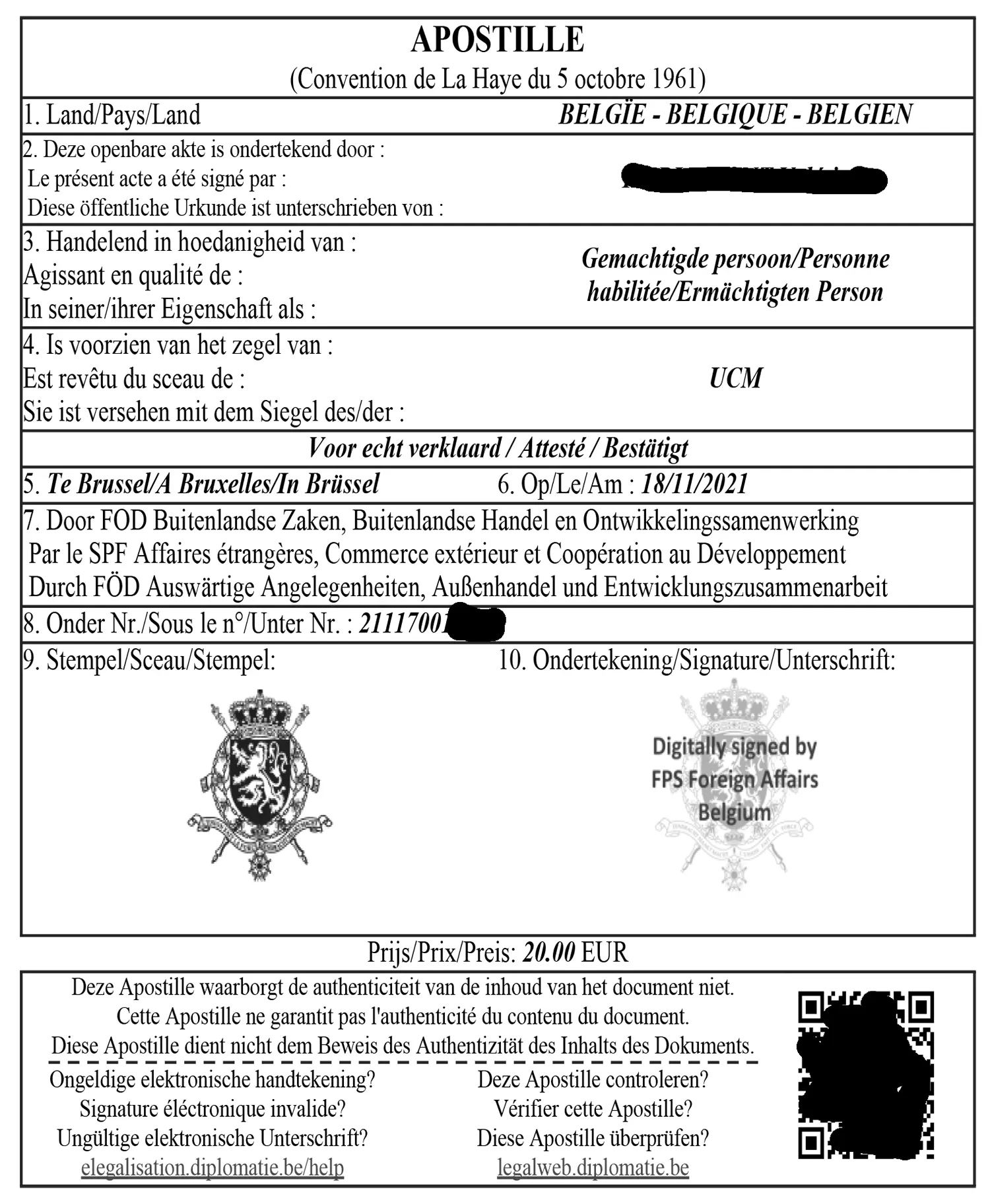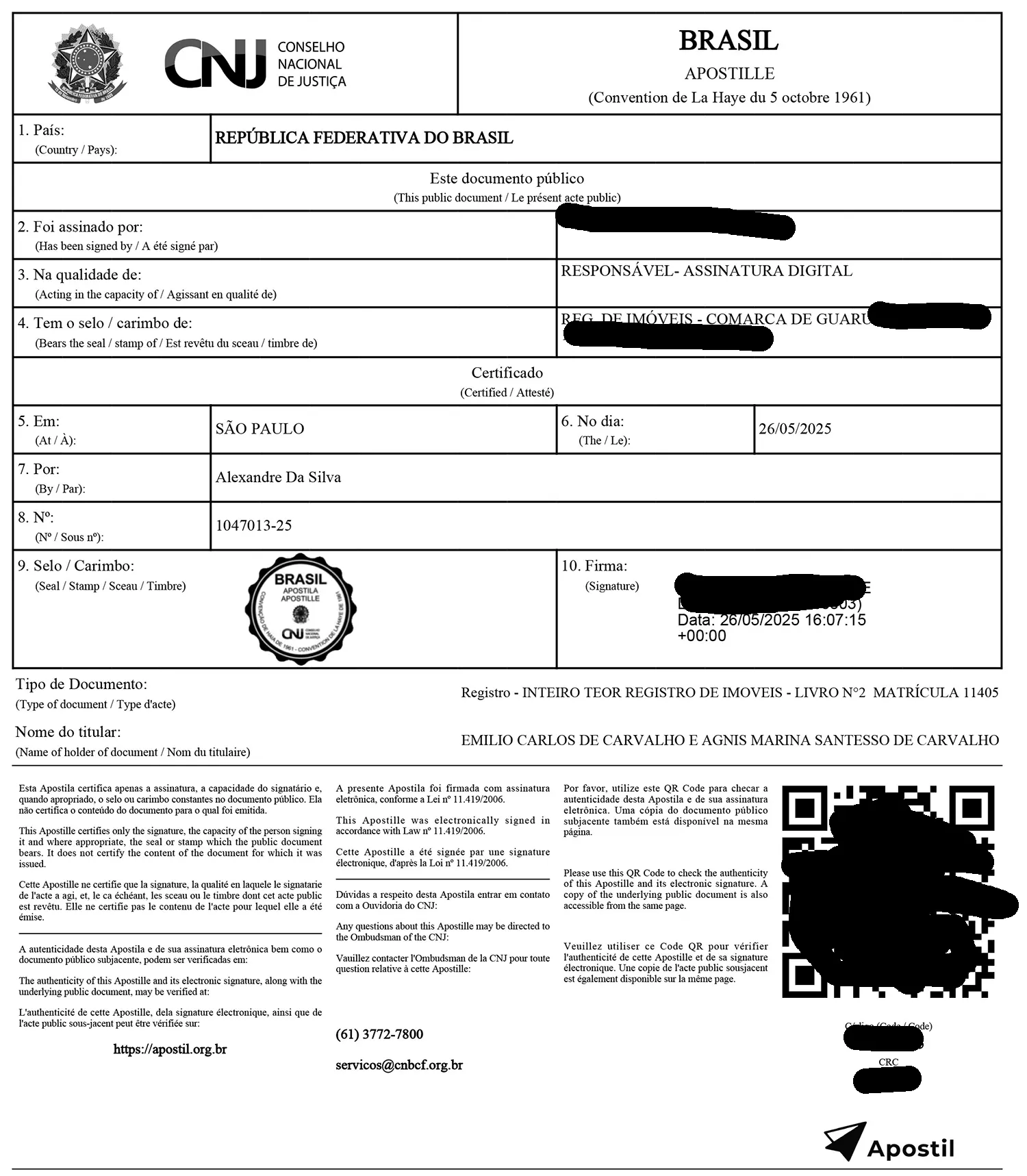
Im internationalen Dokumentenverkehr spielt das Verfahren zur Anerkennung und Bestätigung der Rechtsgültigkeit von Dokumenten außerhalb des Ausstellungsstaates eine zentrale Rolle. Es gibt zwei Hauptwege: die konsularische Legalisierung und die Apostille.
Die konsularische Legalisierung ist ein komplexes und langwieriges Verfahren, bei dem ein Dokument Schritt für Schritt durch diplomatische oder konsularische Vertretungen jedes beteiligten Staates beglaubigt werden muss. Die Apostille hingegen stellt ein vereinfachtes Verfahren dar, das zwischen den Vertragsstaaten des Haager Übereinkommens von 1961 Anwendung findet und den Anerkennungsprozess erheblich beschleunigt und erleichtert.
Wie Schmidt & Schmidt bereits berichtete, hat sich mit dem Fortschritt der digitalen Technologien eine neue Form der Apostille entwickelt – die elektronische Apostille (e-APP), die die Ausstellung und Überprüfung von Dokumenten vollständig in elektronischer Form ermöglicht. Ziel dieser innovativen Lösung ist es, die Geschwindigkeit, Benutzerfreundlichkeit und Sicherheit des internationalen Dokumentenverkehrs zu erhöhen. In diesem Artikel betrachten wir die aktuelle rechtliche Regulierung der elektronischen Apostille sowie die wichtigsten Herausforderungen, denen Staaten und Bürger bei ihrer Anwendung begegnen.
Internationale Regelung der elektronischen Apostille
Haager Übereinkommen von 1961
Das Haager Übereinkommen zur Befreiung ausländischer öffentlicher Urkunden von der Legalisation (1961) ist das grundlegende internationale Abkommen, das das Verfahren zur Anerkennung offizieller Dokumente zwischen den Vertragsstaaten erheblich vereinfacht hat. Vor seinem Inkrafttreten war ein aufwändiges, mehrstufiges Verfahren über Konsulate erforderlich. Das Übereinkommen führte das Instrument der Apostille ein – ein spezielles Zertifikat, das dieses gesamte Verfahren ersetzt und die Echtheit der Unterschrift, des Stempels oder Siegels bestätigt. Beispiele für dokumente, die eine Apostille erfordern, sind Bildungsnachweise, Eigentumsurkunden oder Unternehmensunterlagen.
Allerdings sah der ursprüngliche Wortlaut des Übereinkommens ausschließlich eine Apostille in Papierform vor – was in den 1960er Jahren dem damaligen Stand der Technik entsprach. Mit dem Aufkommen digitaler Technologien entstand jedoch die Notwendigkeit, das Apostillierungsverfahren an die neuen Gegebenheiten anzupassen – so entstand die elektronische Apostille. Ein elektronischer Apostille ist das digitale Analog zum Papier-Apostille, das dieselben Funktionen erfüllt, jedoch in elektronischer Form.
| Apostille | Konsularische Legalisierung | |
|---|---|---|
| Anwendung | Kann nur zwischen den Vertragsstaaten des Haager Übereinkommens zur Vereinfachung der Legalisierung von Dokumenten verwendet werden. | Wird zwischen Staaten verwendet, von denen einer oder beide nicht dem Haager Übereinkommen beigetreten sind, oder wenn ein Vertragsstaat gegen den Beitritt des anderen protestiert hat. |
| Schwierigkeit der Beschaffung | Mittel. Die Apostille muss bei der zuständigen Behörde im Ausstellungsstaat des Dokuments beantragt werden. | Hoch. Für die konsularische Legalisierung sind mehrere Behördengänge und Konsulatsbesuche im Ausstellungsstaat erforderlich. |
| Vorprüfung der Echtheit | In der Regel nicht erforderlich. | Eine vorherige Beglaubigung durch die ausstellende Behörde ist erforderlich. |
| Legalisierung durch das Konsulat des Bestimmungslandes | Ein Besuch beim Konsulat des Bestimmungslandes ist nicht erforderlich. | Der letzte Schritt der Legalisierung erfolgt im Konsulat des Bestimmungslandes, in der Regel im Ausstellungsstaat des Dokuments. |

Empfehlungen der HCCH zur Anwendung der e-APP
Die Haager Konferenz für Internationales Privatrecht (HCCH), zuständig für die Weiterentwicklung und Umsetzung des Haager Übereinkommens, beschäftigt sich aktiv mit der Einführung der elektronischen Apostille. In diesem Zusammenhang hat die HCCH das Apostille-Handbuch zur Anwendung der elektronischen Apostille (e-APP) entwickelt. Darin sind bewährte internationale Praktiken sowie Empfehlungen zur technischen Umsetzung und zur Gewährleistung der Sicherheit zusammengefasst.
Das Apostille-Handbuch enthält unter anderem Empfehlungen zur verpflichtenden Nutzung eines einheitlichen Apostillenformats, zur Unterstützung qualifizierter elektronischer Signaturen sowie zur Einrichtung öffentlicher elektronischer Register, mit denen die Echtheit elektronischer Apostillen schnell und zuverlässig überprüft werden kann. Die Nutzung der e-APP bleibt jedoch freiwillig – jeder Staat entscheidet eigenständig über die Einführung in seine nationale Praxis, abhängig von der jeweiligen Gesetzgebung und den technischen Möglichkeiten.
Damit stellt die e-APP ein modernes Instrument dar, das den internationalen Verkehr öffentlicher Urkunden effizienter und sicherer gestalten soll. Die Einführung der elektronischen Apostille ist ein wichtiger Schritt auf dem Weg zur Digitalisierung juristischer Verfahren und zur Vereinfachung des grenzüberschreitenden Dokumentenverkehrs.
Aktuelle Praxis der Verwendung der elektronischen Apostille
Technische Aspekte elektronischer Signaturen und Zertifikate
Die für die elektronische Apostille verwendeten elektronischen Signaturen basieren auf der Technologie der Public-Key-Infrastruktur (PKI), die ein hohes Maß an Sicherheit und Vertrauen gewährleistet.
Ein digitales Zertifikat bestätigt die Identität des Unterzeichners und ermöglicht die Überprüfung der Echtheit der Signatur durch ein Schlüsselpaar – einen privaten und einen öffentlichen Schlüssel. Dies garantiert die Integrität und Authentizität des Dokuments.
Solche Technologien gewährleisten Vertraulichkeit, Authentifizierung, Datenintegrität und Nichtabstreitbarkeit der Signatur – Aspekte, die im elektronischen Dokumentenverkehr von entscheidender Bedeutung sind.
Format und Vorlage der elektronischen Apostille
Ein entscheidender Faktor für das erfolgreiche Funktionieren der elektronischen Apostille ist ein einheitliches Dokumentenformat. Das Haager Übereinkommen schreibt eine verpflichtende Apostillen-Vorlage vor, die sowohl für papiergebundene als auch für elektronische Versionen gleichermaßen gilt. Dies gewährleistet Transparenz und Wiedererkennbarkeit des Dokuments in jedem Vertragsstaat.
Die Verwendung eines standardisierten Formats verhindert technische Probleme im Zusammenhang mit Formatinkompatibilität und erleichtert die Arbeit der Behörden, die ausländische Dokumente entgegennehmen. Im elektronischen Format muss die Apostille „logisch mit dem Ursprungsdokument verknüpft“ sein — das bedeutet, dass beide Dokumente gemeinsam gespeichert und im selben System überprüft werden, was das Vertrauen und die Sicherheit erheblich erhöht.
Die e-APP besteht aus zwei Komponenten:
1. Elektronische Apostille (e-Apostille) — eine digital erstellte Apostille, die mithilfe spezieller Software oder technischer Mittel erzeugt wird und beispielsweise per E-Mail versendet oder zum Download bereitgestellt wird.
2. Elektronisches Register (e-Register) — ein Online-Register für Apostillen, über das der Empfänger die Echtheit des Dokuments überprüfen kann.
Früher wurden e-Register in drei Kategorien unterteilt:
- Kategorie 1: Basisinformationen (Nummer und Ausstellungsdatum der Apostille);
- Kategorie 2: Basisinformationen + Angaben zum Dokument und zur Apostille selbst;
- Kategorie 3: Möglichkeit der digitalen Echtheitsprüfung.
In der aktuellen Fassung des Apostille-Handbuchs werden diese Kategorien nicht mehr verwendet. Gemäß Artikel 7 des Übereinkommens sind die Staaten verpflichtet, im Register folgende Angaben zu vermerken: Name, Nummer und Datum der Apostille sowie Name und Amt der unterzeichnenden Person.
Die Verwendung elektronischer Signaturen zur Beglaubigung elektronischer Apostillen zählt zu den komplexesten und umstrittensten Themen. Im Unterschied zum Dokumentenformat unterliegen elektronische Signaturen der nationalen Gesetzgebung, und die Standards für deren Anerkennung können von Land zu Land variieren. In der Europäischen Union sind beispielsweise qualifizierte elektronische Signaturen, die den Anforderungen der eIDAS-Verordnung entsprechen, als allgemein anerkannter Standard etabliert. Sie ermöglichen eine zuverlässige Identifikation des Unterzeichners sowie die Überprüfung der Befugnisse der ausstellenden Behörde. In anderen Staaten sind solche Standards entweder noch in der Einführung oder gar nicht vorhanden, was Risiken bei der internationalen Echtheitsprüfung von Dokumenten mit sich bringt.
Ein wichtiger Bestandteil des Systems ist das elektronische Register der ausgestellten Apostillen, das öffentlich zugänglich sein und mindestens die zur Verifikation notwendigen Informationen enthalten muss – die Nummer und das Datum der Apostille, die Angaben der unterzeichnenden autorisierten Person sowie Informationen zum Dokument. Elektronische Register ermöglichen eine schnelle und unkomplizierte Überprüfung der Echtheit der Apostille, reduzieren die Gefahr von Fälschungen und erleichtern die Arbeit der Behörden.
Einige Staaten haben solche Register bereits mit Online-Such- und Einsichtsmöglichkeiten realisiert, was die Prozesse deutlich beschleunigt und das Vertrauen in elektronische Dokumente stärkt. Dennoch bleiben Fragen der Sicherheit, universellen Zugänglichkeit und des Schutzes vor Betrug weiterhin relevant.
Vorteile und Herausforderungen in der Praxis der e-APP
Das erste internationale Forum zum Thema elektronische Notariate und elektronische Apostillen, das 2005 in Las Vegas unter der Schirmherrschaft der Haager Konferenz für internationales Privatrecht (HCCH) und der Internationalen Union der lateinischen Notare (TULN) stattfand, versammelte über 170 Vertreter von Behörden aus 31 Ländern. Die Teilnehmer bestätigten einstimmig die Bedeutung der Einführung moderner Technologien im Bereich der Apostillierung und notariellen Beglaubigung.
Das Forum betonte, dass Geist und Wortlaut des Haager Übereinkommens von 1961 der Nutzung moderner digitaler Technologien nicht entgegenstehen. Im Gegenteil, der Einsatz elektronischer Apostillen und die Führung elektronischer Register tragen zur Stärkung des gegenseitigen Vertrauens zwischen den Staaten und zur Erhöhung der Effizienz der internationalen rechtlichen Zusammenarbeit bei.
Vorteile der elektronischen Apostille:
1. Beschleunigung des Legalisierungsprozesses: Die elektronische Apostille verkürzt die Bearbeitungszeit von Dokumenten im Vergleich zur herkömmlichen Papierform erheblich und ermöglicht eine schnellere Bereitstellung der Dokumente für den Auslandsgebrauch.
2. Bequemlichkeit und Zugänglichkeit: Die Möglichkeit, Apostillen online zu erhalten und zu prüfen, erspart den persönlichen Besuch bei Behörden, was insbesondere für entlegene Kunden und internationale Transaktionen von großer Bedeutung ist.
3. Sicherheit und Online-Prüfmöglichkeit: Die elektronische Apostille gewährleistet ein hohes Maß an Fälschungssicherheit durch den Einsatz elektronischer Signaturen und spezialisierter Register und ermöglicht die sofortige Überprüfung der Echtheit des Dokuments über das Internet.
Herausforderungen bei der Einführung der e-APP
Trotz der offensichtlichen Vorteile der Einführung der elektronischen Apostille (e-Apostille) stößt deren Verbreitung und praktische Anwendung auf eine Reihe schwerwiegender Probleme. Diese Schwierigkeiten betreffen sowohl die rechtliche Regulierung als auch die technische Umsetzung in verschiedenen Ländern.
Freiwilligkeit der Anwendung der e-APP für Vertragsstaaten
Eines der Hauptprobleme besteht darin, dass die Teilnahme am e-APP-Programm freiwillig ist. Das bedeutet, dass selbst Staaten, die dem Übereinkommen beigetreten sind, nicht verpflichtet sind, die elektronische Apostille und das dazugehörige System einzuführen. Dies führt zu erheblichen Unterschieden zwischen den Ländern: Einige verwenden umfassende digitale Lösungen, während andere Apostillen weiterhin ausschließlich in Papierform ausstellen.
Fehlen einheitlicher technischer Standards und Formate
Ein weiteres Problem ist das Fehlen einheitlicher technischer Anforderungen bezüglich Form, Inhalt und Prüfverfahren elektronischer Apostillen. In verschiedenen Ländern werden unterschiedliche Formate elektronischer Dokumente, Arten digitaler Signaturen und Methoden zur Verknüpfung der Apostille mit dem öffentlichen Dokument verwendet. Dies kann bei der internationalen Echtheitsprüfung zu Schwierigkeiten führen, insbesondere wenn die empfangende Seite mit dem jeweiligen Format nicht vertraut ist.
Sicherheitsfragen und Vertrauen in elektronische Signaturen
Die elektronische Apostille setzt die Verwendung digitaler Signaturen voraus, jedoch werden diese aufgrund unterschiedlicher nationaler Regulierungssysteme nicht immer anerkannt oder korrekt geprüft, wenn sie in einer anderen Gerichtsbarkeit verwendet werden. Dies gilt insbesondere für Länder, die nicht Teil eines einheitlichen digitalen Raums sind, wie beispielsweise die EU. Ein Mangel an Transparenz bezüglich der Herkunft des digitalen Zertifikats kann das Vertrauen in das elektronische Dokument untergraben und dessen Akzeptanz erschweren.
Begrenzte Verfügbarkeit in einigen Ländern
Derzeit haben nur wenige Länder die volle Funktionalität der e-APP implementiert, einschließlich elektronischer Apostillen und öffentlicher Register zur Überprüfung. In den meisten Fällen wird das elektronische Format parallel zur Papierform verwendet, wobei die Wahl vom jeweiligen ausstellenden Amt abhängt. In einigen Ländern ist die digitale Apostille nur für bestimmte Dokumententypen oder über bestimmte Behörden verfügbar.
Technische und rechtliche Schwierigkeiten bei der Prüfung elektronischer Apostillen
Selbst wenn die elektronische Apostille ordnungsgemäß ausgestellt wurde, kann die empfangende Partei bei der Überprüfung auf technische oder rechtliche Schwierigkeiten stoßen. Beispielsweise kann das Fehlen eines Verweises auf ein offizielles elektronisches Register oder ein ungültiger QR-Code das Risiko von Fehlern, Phishing und sogar Fälschungen erhöhen. Zudem fehlt eine zentrale internationale Plattform zur Verifikation elektronischer Apostillen, was die Aufgabe für Nutzer erschwert und die Effektivität digitaler Lösungen mindert.
Elektronische Apostille weltweit

Trotz der offensichtlichen Vorteile digitaler Technologien bleibt die praktische Anwendung der e-APP weltweit uneinheitlich. Dies liegt daran, dass das Apostille-Handbuch der HCCH lediglich empfehlenden Charakter hat und die Vertragsstaaten des Haager Übereinkommens nicht verpflichtet, das elektronische Format zu verwenden. Infolgedessen haben einige Staaten die elektronische Apostille vollständig in ihre staatlichen Systeme integriert und ermöglichen sowohl die Beantragung als auch die Ausstellung in digitaler Form. Andere hingegen halten weiterhin an der traditionellen Papierform fest und verweisen auf rechtliche, technische oder organisatorische Hürden.
Laut der von der Haager Konferenz veröffentlichten Übersicht zum Stand der Umsetzung haben bislang folgende Staaten beide Komponenten der e-APP – also e-Apostille und e-Register – eingeführt :
- Argentinien, Armenien;
- Bahrain, Bangladesch, Belgien, Bolivien, Brasilien, Bulgarien;
- Chile, China;
- Dänemark, Dominikanische Republik;
- Ecuador, Estland, El Salvador;
- Frankreich;
- Georgien, Griechenland, Guatemala;
- Israel;
- Kasachstan, Kolumbien;
- Lettland;
- Moldawien;
- Neuseeland;
- Panama, Peru, Philippinen;
- Russland;
- Singapur, Slowenien, Südkorea, Spanien;
- Türkei;
- Vereinigtes Königreich, Vereinigte Staaten;
- Uruguay, Usbekistan;
- Österreich.
Elektronische Apostille in Deutschland
Im deutschen Recht wird der Umgang mit elektronischen öffentlichen Urkunden durch § 371a Abs. 3 und § 371b der Zivilprozessordnung (ZPO) geregelt. Nach diesen Bestimmungen gelten Urkunden, die von staatlichen Stellen oder Amtsträgern erstellt und mit einer qualifizierten elektronischen Signatur versehen sind, als authentisch . Diese Vorschriften beziehen sich jedoch ausschließlich auf inländische deutsche Urkunden. Eine direkte Regelung des Status ausländischer öffentlicher elektronischer Urkunden fehlt im deutschen Recht. Nach Ansicht von Juristen deutet dies darauf hin, dass der Gesetzgeber nicht beabsichtigt, diese Normen auf Dokumente anzuwenden, die außerhalb Deutschlands ausgestellt wurden.
Daher bleibt die Anerkennung ausländischer elektronischer Dokumente und elektronischer Apostillen in Deutschland außerhalb der rechtlichen Regelung. In der Praxis bedeutet dies, dass solche Dokumente nicht automatisch Beweiskraft besitzen und einer zusätzlichen Echtheitsprüfung bedürfen. Obwohl das Haager Übereinkommen von 1961, das das bisherige Legalisationsverfahren (§ 438 Abs. 2 ZPO) ersetzt hat, die Verwendung der Apostille vorsieht, hat Deutschland die elektronische Apostille (e-APP) nicht in sein Rechtssystem integriert. Das Gesetz zur Ratifizierung des Übereinkommens erkennt nur die papierhaften Apostillen an. Jede Abweichung von den Bestimmungen des Übereinkommens, so das Bundesverfassungsgericht, erfordert ein gesondertes Gesetz, da wesentliche Änderungen nicht durch das ursprüngliche Ratifizierungsgesetz abgedeckt sind.
In Ermangelung einer nationalen Regelung für elektronische Apostillen behält Deutschland die Papierform als einzig anerkannten Standard bei. Somit kann Deutschland auch dann die Anerkennung verweigern, wenn ein Dokument elektronisch in einem anderen Vertragsstaat erstellt wurde, sofern das elektronische Dokument oder die elektronische Unterschrift nach deutschem Recht nicht der Papierform beziehungsweise der eigenhändigen Unterschrift gleichgestellt sind.
Es ist zu beachten, dass die Bestimmungen des Handbuchs zur Anwendung des Übereinkommens Abweichungen zwischen den Vertragsstaaten hinsichtlich der Anerkennung elektronischer Dokumente zulassen. Dennoch ist gemäß diesem Handbuch die Ablehnung der Anerkennung einer Apostille allein aus dem Grund, dass sie in elektronischer Form erstellt wurde, nur in Ausnahmefällen zulässig – zum Beispiel, wenn das nationale Recht des Empfängerstaates ausschließlich die Papierform verlangt oder die Rechtsgültigkeit der elektronischen Signatur nicht anerkennt.
Damit bewahrt Deutschland trotz globaler Digitalisierungstrends und der Einführung elektronischer Rechtsinstrumente einen konservativen Ansatz und verlangt die Schaffung zusätzlicher rechtlicher Grundlagen für die vollständige Implementierung des e-APP-Systems. Bis heute begrenzt das Fehlen einer rechtlichen Anerkennung elektronischer Apostillen den internationalen Verkehr elektronischer Dokumente und versetzt Deutschland in die Position eines Nachzügler im Bereich des internationalen Dokumentenverkehrs.
Elektronischer Apostille in der Ukraine
Die Ukraine ist Vertragsstaat des Haager Übereinkommens von 1961 und hat seit der Einführung der elektronischen Apostille am 20. November 2015 ein neues Verfahren zur Beglaubigung von Dokumenten eingeführt, ohne dabei die Liste der apostillpflichtigen Dokumente zu verändern. Zu diesen Dokumenten gehören: Gerichtsentscheidungen, notarielle Dokumente (Vollmachten, Genehmigungen, Erklärungen), Personenstandsakte (Auszüge und Urkunden) sowie Dokumente, die eine doppelte Apostillierung erfordern. Letztere beinhaltet die Apostillierung des Originals, die notarielle Beglaubigung der Übersetzung und die erneute Apostillierung der Übersetzung.
Im Gegensatz zum alten Verfahren, bei dem ein Stempel auf das Papieroriginal gesetzt wurde, stellt die neue elektronische Apostille ein eigenes gedrucktes Formular mit einer speziellen Marke und einem QR-Code dar. Dieses Formular wird dem Originaldokument beigefügt und ermöglicht die Online-Bestätigung seiner Echtheit.
Die Verifizierung der elektronischen Apostille ist auf zwei Arten möglich: entweder durch das Scannen des QR-Codes mit einem mobilen Gerät oder über die offizielle Website des Justizministeriums der Ukraine. Beide Methoden ermöglichen einen schnellen Zugang zur digitalen Apostille und erlauben sowohl Privatpersonen als auch Behörden, die Echtheit zu überprüfen. Dies erhöht das Vertrauen ausländischer Institutionen und erleichtert die internationale Anerkennung ukrainischer Dokumente.
Vor der Einführung des elektronischen Systems war das Apostillierungsverfahren zentralisiert und wurde ausschließlich in Kiew durchgeführt, was zu erheblichen bürokratischen Hürden und Verzögerungen führte. Seit 2015 kann das Apostill bei jeder örtlichen Standesamtsstelle am Wohnort beantragt werden. Die Bearbeitungszeit beträgt bei Vorliegen der erforderlichen Marken 2 bis 4 Werktage. Die staatlichen Vorschriften legen eine maximale Bearbeitungsfrist von 2 Tagen für den Antrag fest, die restliche Zeit dient der technischen Dokumentenvorbereitung.
Es ist geplant, den Service weiterzuentwickeln: Möglichkeit zur eigenständigen Statusverfolgung, Erhalt der Apostille per E-Mail und eigenständiger Ausdruck des Formulars durch den Nutzer. In der Praxis treten jedoch Schwierigkeiten auf, die mit unzureichender Information der Standesamtsmitarbeiter über die Anforderungen verschiedener Länder an das Apostillformat zusammenhängen, was die Qualität der Dienstleistung beeinträchtigen kann.
Elektronische Apostille in Russland
Seit dem 1. Juli 2022 gilt in Russland eine Regierungsverordnung, die das Verfahren zur Bearbeitung von Anträgen auf die Ausstellung einer elektronischen Apostille auf amtlichen Dokumenten regelt, die für die Verwendung außerhalb des Landes bestimmt sind. Diese Entscheidung ist ein logischer Schritt im Rahmen der Digitalisierung des juristischen Dokumentenverkehrs und der Integration in internationale Standards der vereinfachten Legalisierung von Dokumenten, die durch das Haager Übereinkommen von 1961 festgelegt wurden.
Der Antrag auf Ausstellung einer elektronischen Apostille wird über das Einheitliche Portal staatlicher Dienstleistungen gestellt und muss mit einer qualifizierten elektronischen Signatur mit erweiterter Sicherheit (QES) unterzeichnet sein). Die gesamte behördenübergreifende Prüfung der Dokumente erfolgt über das System für behördenübergreifende elektronische Interaktion (SMEV), was die Bearbeitungszeiten erheblich verkürzt und die Zuverlässigkeit der Antragsbearbeitung erhöht.
Die elektronische Apostille ist ein digitales Dokument, das einen zweidimensionalen Barcode (QR-Code) enthält, mit dem die Echtheit überprüft werden kann. Auf Wunsch des Antragstellers kann ein Papierduplikat ausgestellt werden. Das Apostillenregister wird elektronisch geführt.
Die elektronische Apostille in Russland wird ausschließlich auf Dokumente angebracht, die von vornherein elektronisch erstellt und mit einer qualifizierten elektronischen Signatur einer befugten Person versehen sind. Ein bloßes Scannen oder Fotografieren des Dokuments reicht nicht aus – es ist die Verfügbarkeit elektronischer Schlüssel (im Format *.sig) zur Überprüfung der Echtheit der Signatur erforderlich. Dies schränkt den Kreis der Dokumente ein, die einer elektronischen Legalisierung zugänglich sind, da nicht alle Einrichtungen und Notare zertifizierte digitale Signaturen verwenden, die den Anforderungen des Justizministeriums entsprechen.
Beispielsweise wurde bei Notaren ein Verfahren zur elektronischen Identitätsfeststellung eingeführt, das die Umwandlung von Papierdokumenten in elektronische Dokumente mit anschließender Unterzeichnung mittels qualifizierter elektronischer Signatur ermöglicht. Allerdings verfügen noch nicht alle Regionen und Einrichtungen über die technischen Möglichkeiten oder die rechtliche Grundlage für die vollständige Umsetzung dieses Verfahrens.
Eine der wichtigsten Einschränkungen des aktuellen Modells der elektronischen Apostillierung in Russland ist die Unmöglichkeit, Übersetzungen elektronisch notariell zu beglaubigen. Da die notarielle Beglaubigung von Übersetzungen weiterhin ausschließlich auf Papier mit physischen Unterschriften und Stempeln erfolgt, kann die elektronische Apostille nicht in Fällen verwendet werden, in denen das Dokument eine offizielle Übersetzung erfordert. Infolgedessen wird das apostillierte elektronische Dokument praktisch nutzlos, wenn eine notariell beglaubigte Papierübersetzung für die Vorlage bei einer ausländischen Behörde verlangt wird.
Elektronische Apostille in Kasachstan
Am 15. Juni 2024 sind in der Republik Kasachstan Änderungen der Vorschriften zur Erbringung der staatlichen Dienstleistung der Apostillierung offizieller Dokumente in Kraft getreten. Die neue Fassung sieht eine vollständige Digitalisierung des Prozesses vor — der Antrag auf Apostille wird elektronisch über das Portal der „Elektronischen Regierung“ (Egov) unter Verwendung einer elektronischen digitalen Signatur (EDS) gestellt.
Für die Antragstellung über das Portal sind folgende Unterlagen erforderlich:
- ein elektronischer Antrag, der mit einer EDS unterschrieben ist (oder mittels Einmalpasswort bestätigt wird, sofern eine registrierte Telefonnummer vorliegt);
- eine eingesannte Kopie des zu apostillierenden Dokuments;
- eine Vollmacht (notariell beglaubigt bei Antragstellung durch einen Vertreter einer natürlichen Person; vom Geschäftsführer unterschrieben bei Antragstellung im Namen einer juristischen Person);
- bei Bedarf weitere Dokumente.
Der Antrag und die Dokumente werden vom Servicezentrum für Bevölkerung (Zentrum für Dienstleistung an die Bevölkerung, ЦОН) geprüft, insbesondere die Unterschriftsprobe und der Stempelabdruck auf dem eingereichten Dokument sowie die Übereinstimmung mit den Anforderungen des Haager Übereinkommens und den innerstaatlichen Rechtsvorschriften.
Bei positivem Prüfungsergebnis erstellt die zuständige Behörde noch am selben Arbeitstag die elektronische Apostille mithilfe des Informationssystems „E-Apostille“. Das unterzeichnete Ergebnis wird dem Antragsteller im persönlichen Konto auf dem Portal Egov übermittelt. Die Apostillierung ist am nächsten Arbeitstag nach Antragstellung abgeschlossen.
Die elektronische Apostille wird im digitalen Format ausgestellt und enthält einen Link zur Verifikationsseite, auf der Behörden anderer Staaten die Echtheit der Apostille anhand eines Sicherheitscodes und der Antragsnummer überprüfen können. Die Gebühr für die Dienstleistung beträgt 0,5 MRP (monatlicher Berechnungsindikator) pro Dokument(gemäß Unterpunkt 7 des Artikels 615 des Steuergesetzbuchs der Republik Kasachstan).
Was ist eine Apostille?
Was ist eine Apostille? Warum brauche ich eine Apostille? Wie bekomme ich eine Apostille? - Unser Video erklärt Ihnen alles, was Sie über die Apostille wissen wollen. Wenn Sie eine ausländische Urkunde durch eine Apostille legalisieren möchten, steht Ihnen Schmidt & Schmidt immer bei! Wir bieten Apostille-Service in mehr als 100 Ländern weltweit an.
Wie können wir Ihnen helfen?
Im internationalen Dokumentenverkehr werden nach wie vor weitgehend klassische Verfahren zur Echtheitsbestätigung von Dokumenten genutzt – die traditionelle konsularische Legalisation und die Apostille gemäß der Haager Konvention von 1961. Trotz der Fortschritte in der digitalen Technologie erkennen viele Länder elektronische Dokumentenformen noch nicht an und verlangen eine Papierbestätigung.
Gleichzeitig gewinnt die elektronische Apostille zunehmend an Verbreitung. Sie ermöglicht eine deutliche Beschleunigung des Legalisationsprozesses und macht ihn durch die Möglichkeit der Online-Überprüfung bequemer und sicherer. Allerdings ist die Einführung der elektronischen Apostille mit bestimmten technischen und rechtlichen Herausforderungen verbunden, über die man informiert sein sollte.
Schmidt & Schmidt bietet umfassende Dienstleistungen zur Begleitung aller Phasen der Legalisierung an:
- Beschaffung klassischer Apostillen und Durchführung der traditionellen konsularischen Legalisation für Dokumente, die für den Auslandseinsatz bestimmt sind;
- Ausstellung elektronischer Apostillen in Ländern, in denen diese bereits angewendet werden, unter Berücksichtigung internationaler Standards;
- Prüfung der Echtheit und Rechtsgültigkeit von Dokumenten mit Apostille – sowohl in Papier- als auch in elektronischer Form;
- Vorbereitung von Dokumenten unter Berücksichtigung der Anforderungen des jeweiligen Landes und der Besonderheiten des gewählten Verfahrens zur Echtheitsbestätigung;
- Beratung zu internationaler Regulierung, aktueller Praxis bei der Anwendung von Apostillen und elektronischen Apostillen.
Wir garantieren Ihnen eine hochwertige und zeitnahe Betreuung in allen Phasen, um Ihre internationalen Geschäfte zu vereinfachen und Ihnen Rechtssicherheit bei der Verwendung von Dokumenten im Ausland zu bieten.





